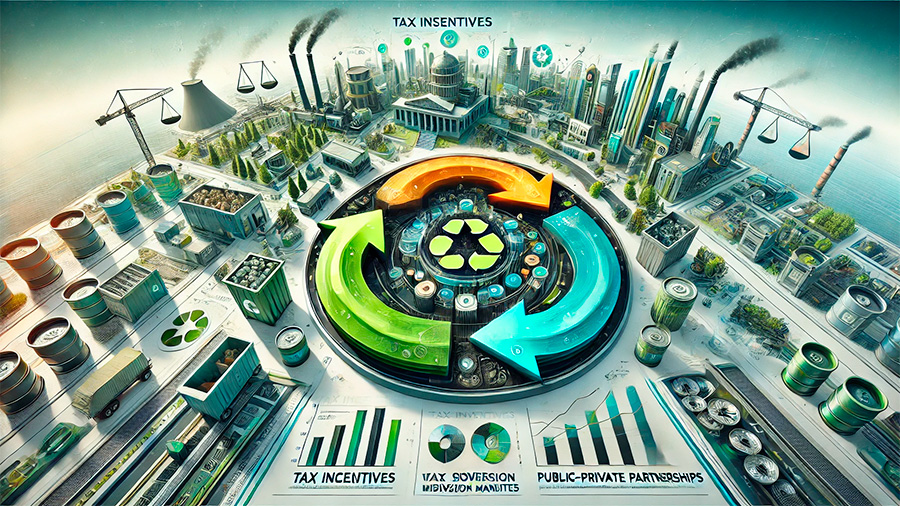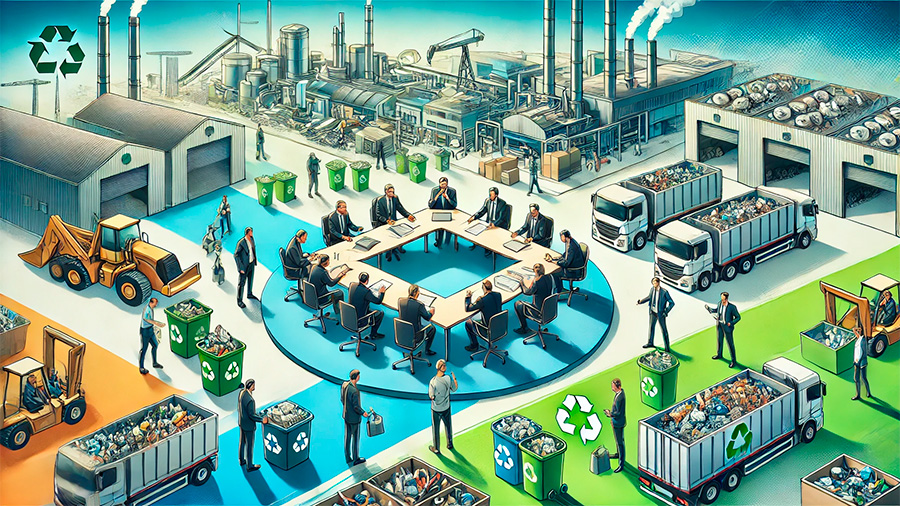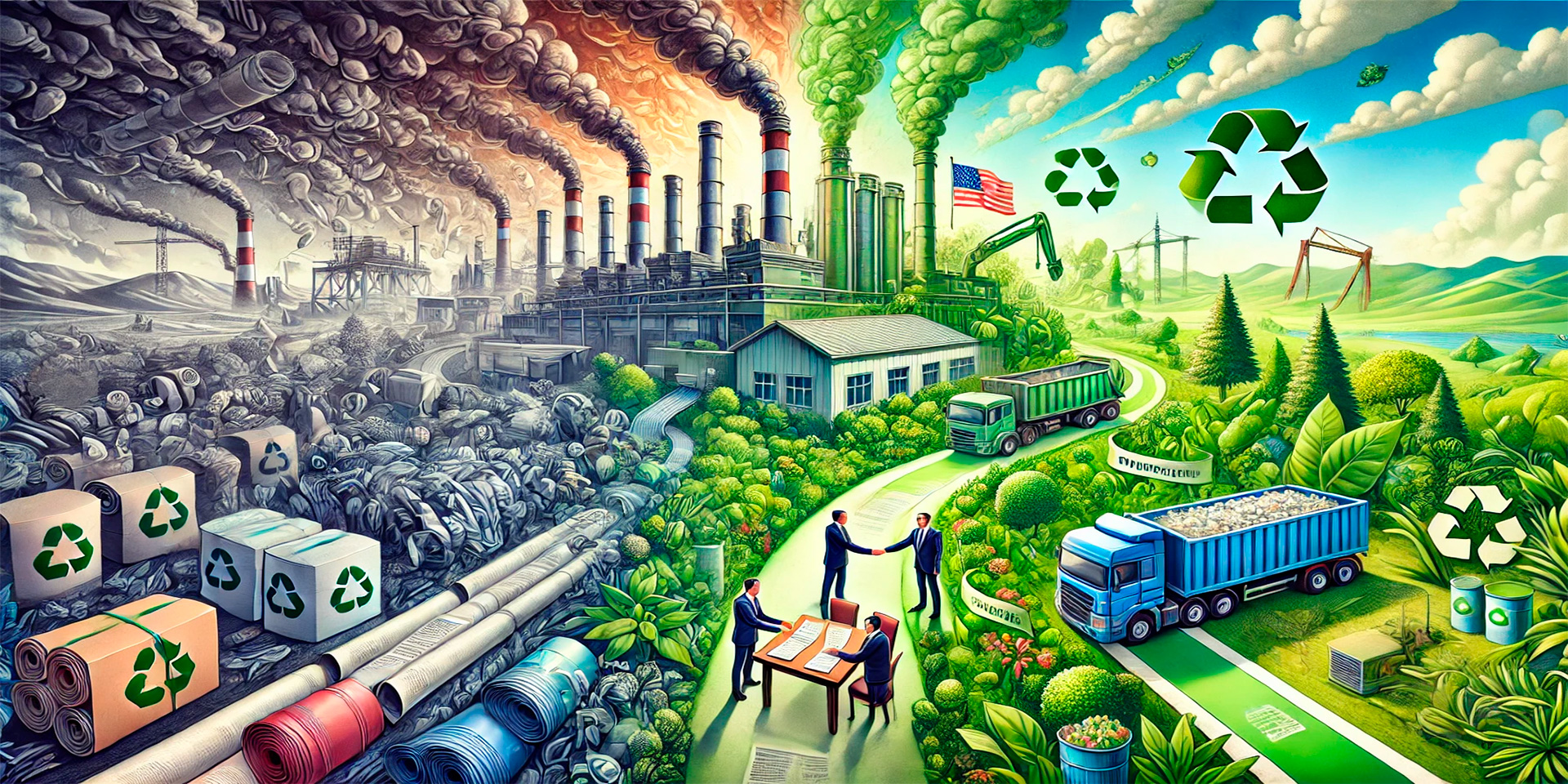As the world grapples with increasing waste and environmental degradation, the need for effective recycling practices has never been more critical. Recycling helps conserve natural resources, reduce landfill waste, and lower pollution levels, making it essential for environmental sustainability. Recognizing these benefits, many governments have implemented a range of policies, subsidies, and public-private partnerships to stimulate the recycling industry. This article explores how states are driving recycling efforts to combat pollution and the positive impact these initiatives are having on the environment.
The Importance of Recycling in Combating Pollution
Recycling plays a vital role in reducing pollution by diverting waste from landfills and minimizing the need for virgin materials. When waste is recycled, it reduces the environmental footprint of production processes, cuts down on greenhouse gas emissions, and saves energy. However, the effectiveness of recycling programs depends largely on government policies, investment, and collaboration with private industries.
1. Environmental Benefits of Recycling
Recycling helps mitigate the environmental damage caused by mining, manufacturing, and waste disposal. By reprocessing materials such as paper, plastics, metals, and glass, recycling reduces the demand for raw materials, curbing habitat destruction, deforestation, and water pollution.
Key environmental benefits of recycling:
- Reducing landfill waste: Recycling reduces the volume of waste sent to landfills, which helps prevent land and water pollution caused by the decomposition of waste in landfills.
- Lowering greenhouse gas emissions: By recycling materials, less energy is required to produce new products, leading to a reduction in carbon emissions and other harmful pollutants.
- Conserving natural resources: Recycling reduces the need for mining and harvesting of raw materials, conserving natural resources and protecting ecosystems.
2. Economic and Social Benefits of Recycling
Recycling not only benefits the environment but also provides significant economic and social advantages. It creates jobs, stimulates local economies, and supports the development of green technologies. Furthermore, the recycling industry can lead to cost savings for businesses and governments, promoting long-term sustainability.
Economic and social benefits of recycling:
- Job creation: The recycling industry generates employment opportunities in collection, sorting, processing, and sales of recyclable materials, contributing to local economies.
- Energy savings: Recycling is generally more energy-efficient than producing goods from virgin materials, helping companies reduce operational costs.
- Public awareness and education: Recycling initiatives help raise awareness about environmental issues, encouraging individuals and businesses to adopt sustainable practices.

Government Policies and Incentives for Recycling
Governments around the world are implementing a variety of policies to promote recycling. These policies aim to increase recycling rates, reduce waste, and encourage sustainable resource management. From tax incentives to waste diversion mandates, government actions are shaping the future of recycling.
1. Extended Producer Responsibility (EPR) Programs
Extended Producer Responsibility (EPR) is a policy approach that holds manufacturers accountable for the lifecycle of their products, including their disposal and recycling. By shifting the responsibility for product end-of-life management to producers, EPR programs incentivize businesses to design products that are easier to recycle and to reduce packaging waste.
How EPR policies promote recycling:
- Incentivizing sustainable design: Manufacturers are encouraged to create products that are more durable, reusable, or easier to recycle, reducing waste at the consumer level.
- Fund recycling programs: EPR policies typically require producers to contribute to the costs of collection, sorting, and recycling their products, ensuring that the infrastructure to recycle is adequately funded.
- Promote product take-back schemes: Many EPR programs include mechanisms for consumers to return used products for recycling, such as electronics, packaging, and batteries.
2. Subsidies and Tax Incentives
Governments provide financial incentives to businesses and individuals to encourage recycling. These can include subsidies for recycling infrastructure, tax credits for recycling-related activities, and grants for research and development of new recycling technologies. These incentives help reduce the financial barriers to recycling and encourage greater participation across all sectors.
How subsidies and tax incentives work:
- Subsidies for recycling facilities: Governments may offer funding to build or upgrade recycling facilities, increasing the capacity to process recyclable materials and reducing operational costs for recycling companies.
- Tax credits for recycling businesses: Businesses that engage in recycling or use recycled materials in their products may be eligible for tax breaks or credits, making recycling more cost-effective.
- Funding for innovation: Governments often provide grants for the development of new recycling technologies or processes that can increase efficiency and reduce environmental impact.
3. Waste Diversion Mandates and Recycling Laws
To ensure higher recycling rates, many governments have implemented waste diversion mandates that require businesses and individuals to separate recyclables from regular waste. These mandates often come with penalties for non-compliance, encouraging adherence to recycling programs.
How waste diversion mandates promote recycling:
- Recycling mandates for businesses: Many states and countries require businesses to divert a certain percentage of waste away from landfills by recycling or composting, ensuring that commercial waste is properly managed.
- Municipal recycling programs: Local governments often implement curbside recycling programs that make it easier for residents to participate in recycling efforts, ensuring that households have access to recycling bins and services.
- Mandatory recycling for specific materials: Some jurisdictions mandate the recycling of specific materials, such as electronics, glass bottles, or plastic containers, to increase the recovery of valuable resources.

Public-Private Partnerships in Recycling
Public-private partnerships (PPPs) play a crucial role in advancing recycling efforts. Governments collaborate with private companies, including recycling firms, waste management companies, and manufacturers, to improve recycling infrastructure, increase collection efficiency, and create new markets for recyclable materials.
1. Collaborative Infrastructure Development
Governments and private sector companies work together to build the infrastructure needed to handle recyclable materials efficiently. This includes the development of recycling centers, sorting facilities, and transportation networks that ensure materials are processed and returned to the market.
Benefits of public-private partnerships in recycling:
- Expanding recycling facilities: By pooling resources, governments and private companies can build more efficient and larger-scale recycling facilities, improving the overall recycling capacity.
- Improving collection systems: Public-private partnerships often lead to innovations in waste collection methods, ensuring that recyclable materials are collected more effectively and at a lower cost.
- Advancing technology: Collaboration can also focus on the development of new technologies, such as sorting robots or automated systems, that improve the efficiency and effectiveness of recycling processes.
2. Creating Market Demand for Recycled Materials
Governments and private companies also work together to create a stable market for recycled materials. By establishing policies that encourage the use of recycled materials in manufacturing, governments help ensure that the demand for recyclables remains strong.
How PPPs foster market demand:
- Incentivizing recycled content: Governments can introduce regulations that require manufacturers to use a certain percentage of recycled materials in their products, encouraging businesses to source materials from recycling programs.
- Creating partnerships with manufacturers: Governments can collaborate with businesses to develop closed-loop systems, where products are made entirely from recycled materials, driving demand for recyclables and encouraging companies to invest in recycling infrastructure.
- Establishing certification systems: Governments and industry associations can create certification programs that recognize companies that use recycled content, providing them with a competitive advantage.
Challenges in Stimulating Recycling and Overcoming Barriers
While government policies and partnerships play a significant role in stimulating recycling efforts, challenges remain. These include overcoming consumer apathy, addressing logistical issues in waste collection, and ensuring that recycling systems are efficient and cost-effective.
1. Educating the Public
One of the main barriers to recycling is a lack of awareness and understanding about its benefits. Governments must invest in public education campaigns to inform citizens about the importance of recycling and the proper methods for separating waste.
2. Addressing Infrastructure Gaps
In many areas, recycling infrastructure is either insufficient or outdated. Governments must continue to invest in upgrading recycling facilities, improving waste collection systems, and ensuring that recyclable materials are processed efficiently.
3. Creating Financial Incentives
Despite the environmental benefits, recycling can still be cost-prohibitive for some businesses. Governments must create strong financial incentives to encourage recycling, from subsidies to tax credits that make recycling programs more viable for businesses.
Conclusion
Government policies, subsidies, and public-private partnerships are essential in promoting recycling efforts and addressing the growing problem of waste and pollution. Through initiatives like extended producer responsibility, tax incentives, and investment in recycling infrastructure, governments can stimulate the recycling industry and create sustainable, green economies. However, overcoming barriers such as public apathy and logistical challenges requires ongoing collaboration between the public and private sectors to ensure that recycling is effective and widespread. By continuing to prioritize recycling, governments can combat pollution, conserve resources, and build a more sustainable future for all.

